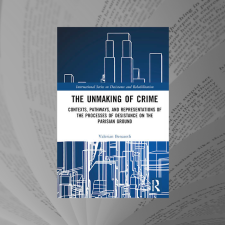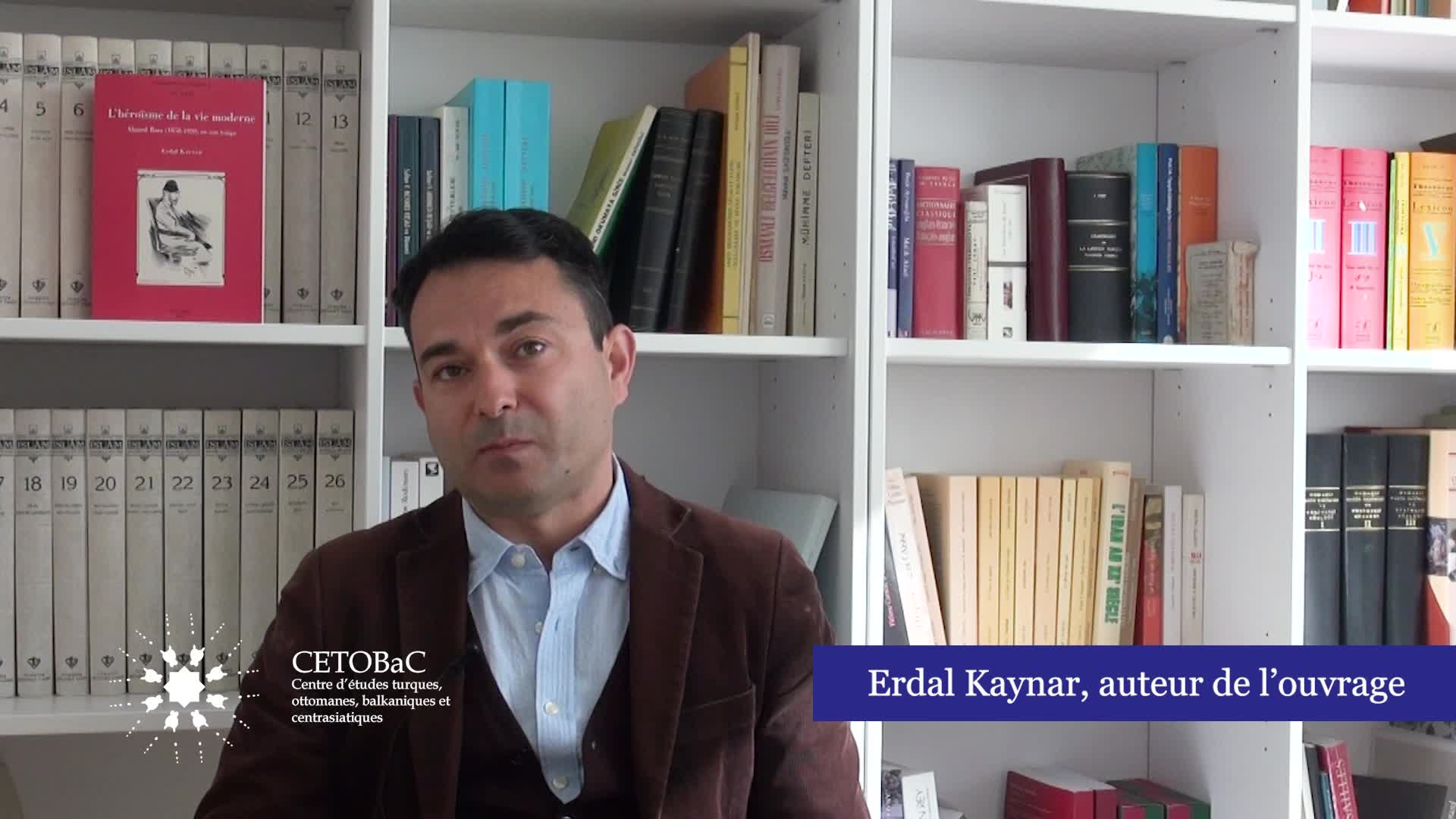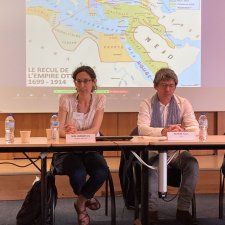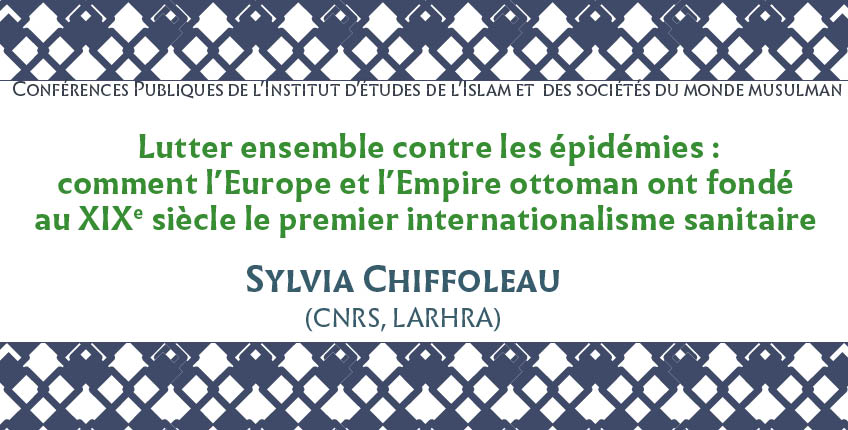Notice
What happened in 1792? The legal status of prostitutes in Istanbul, and its applications
- document 1 document 2 document 3
- niveau 1 niveau 2 niveau 3
Descriptif
Séminaire "La justice dans la société ottomane : institutions, acteurs, pratiques"
Mardi 5 avril 2011 à 18h à l’IFEA
Tülay Artan (Sabancı Üniversitesi)
"What happened in 1792? The legal status of prostitutes in Istanbul, and its applications"
Intervention / Responsable scientifique
Dans la même collection
-
Réflexion sur les origines du panarabisme
Conférence Lundi 22 octobre 2018 à 18h à l'IFEA Dyala Hamzah (Université de Montréal) "Réflexion sur les origines du panarabisme"
-
Les absents, les muftis et les conflits juridiques
AykanYavuzLes absents, les muftis et les conflits juridiques Par Yavuz Aykan (EHESS – Université de Munich) Réalisé le 14 décembre 2010
-
Ottoman kadis acting as notaries in state-enforced dispute resolution between villagers and nomads
FaroqhiSuraiyaUn chercheur à l'honneur : Suraiya Faroqhi Dans le cadre du séminaire "La justice dans la société ottomane : institutions, acteurs, pratiques" Mardi 11 janvier 2011 à 18h00 à l’IFEA Suraiya Faroqhi
-
Investigation and arbitration: the Ottoman police, a new actor in conflict resolution at the end of…
Lévy-AksuNoémiSéminaire "La justice dans la société ottomane : Institutions, acteurs et pratiques" 10 Mayıs Salı, saat 18:00’da, Noémi Lévy-Aksu (Université du Bosphore) “Investigation and arbitration: the
-
Les différents statuts des “occupants” des hans à Istanbul et les modalités d’occupation (XVIIIe s…
PinonMathildeSéminaire "L’Appartenance locale et sa légitimation à l’époque ottomane" Mathilde Pinon (Historienne) "Les différents statuts des “occupants” des hans à Istanbul et les modalités d’occupation
-
L’Appartenance locale et sa légitimation à l’époque ottomane - Présentation du séminaire
TamdoğanIşıkSéminaire "L’Appartenance locale et sa légitimation à l’époque ottomane" Işık Tamdoğan (IFEA - CNRS) Mardi 22 novembre 2011 à 18h à l'IFEA
-
Le regroupement familial à l'ottomane. Exemple de parcours familiaux d'Anatolie centrale à Istanbul…
TapiaAude Aylin deSéminaire "L’Appartenance locale et sa légitimation à l’époque ottomane" Aude Aylin de Tapia (IFEA) "Le regroupement familial à l'ottomane. Exemple de parcours familiaux d'Anatolie centrale à
-
Règlement de l'inspection d'İstanbul (Nizam-ı Teftiş-i Istanbul): les registres d'ordre public et d…
Bas̥aranBetülSéminaire "L’Appartenance locale et sa légitimation à l’époque ottomane" Betül Başaran (St Mary’s college of Maryland) "Règlement de l'inspection d'İstanbul (Nizam-ı Teftiş-i Istanbul): les
-
Une appartenance forcée : le ghetto
ŞeniNoraSéminaire "L’Appartenance locale et sa légitimation à l’époque ottomane" Nora Şeni (IFEA) "Une appartenance forcée : le ghetto" Mardi 10 avril 2012 à 18h à l'IFEA
Sur le même thème
-
Les relations entre la République de Venise et l’Empire ottoman (1453/1517)
GuénaPaulineLa République de Venise et l’Empire ottoman ont entretenu des relations privilégiées entre le XVe et le XVIe siècles, dans des domaines très divers, le commerce, la diplomatie, la gestion des
-
Law, Identity, and Redemption: Justice in Karan Johar’s My Name is Khan
LefrançoisFrédéricCommunication présentée le 9 mai 2025 lors du Colloque international de la SARI "Représentation de la justice dans le cinéma indien 9 et 10 mai 2025" (Université Sorbonne Paris Nord, Campus de
-
Valerian Benazeth - The Unmaking of Crime
BenazethValerianL’ouvrage documente les parcours d’anciens contrevenants qui réforment leur mode de vie et renoncent à la criminalité, analysant les capacités et limites du système pénal pour faciliter ce processus.
-
Regards croisés sur le séisme de 557 à Byzance : histoire, archéologie, sismologie [ép. 2/2]
Pour la rentrée de la saison 2024-2025, nous vous emmenons dans la Byzance du VIe siècle ap. J.-C., non pour admirer les ors des palais et le galbe des coupoles, mais pour vivre avec sa population
-
Regards croisés sur le séisme de 557 à Byzance : histoire, archéologie, sismologie [ép. 1/2]
Pour la rentrée de la saison 2024-2025, nous vous emmenons dans la Byzance du VIe siècle ap. J.-C., non pour admirer les ors des palais et le galbe des coupoles, mais pour vivre avec sa population
-
Autodafé à Istanbul. Une campagne négationniste dans la Turquie des années 1930
SzurekEmmanuelConférences publiques de l’Institut d’études de l’Islam et des sociétés du monde musulman (IISMM) en partenariat avec la Bibliothèque universitaire des langues et civilisations (BULAC).
-
Les femmes dans l'Empire ottoman
DumasJulietteDans la société de cour de l’Empire ottoman les femmes qui font partie de l’élite jouent un rôle important. Du fait de la proximité du pouvoir et de leurs positions hiérarchiques, elles exercent une
-
Interview avec Erdal Kaynar
KaynarErdalErdal Kaynar est spécialiste de l’Empire ottoman et maître de conférences en histoire contemporaine à la Faculté des Sciences Historiques de l’Université de Strasbourg.
-
Odessa-Istanbul-Jaffa. Trajectoires et paradoxes de l'immigration juive en Palestine ottomane (1881…
Seri-HerschIrisCommunication dans le cadre de la table-ronde : Détroits et passages « Dedans / Dehors » « GlobalMed – La Méditerranée et le monde de la Préhistoire à nos jours. Approches interdisciplinaires et
-
Le commerce des esclaves dans l’Empire ottoman ( XVe-XVIIe siècles)
ÖzkorayHayri GökşinDepuis la plus haute Antiquité, l’esclavage fait partie intégrante du fonctionnement des sociétés ; les esclaves se définissent comme des gens d’ailleurs, étrangers, qui sont la propriété d’un maître,
-
Istanbul, ville-monde
PeraldiMichelA Istanbul, ville monde, placée comme une sorte de pivot en Méditerranée, à la jonction de deux continents, trait d’union de multiples courants, Michel Peraldi évoque l’économie de bazar pratiquée par
-
« Lutter ensemble contre les épidémies : comment l’Europe et l’Empire ottoman ont fondé au XIXe siè…
ChiffoleauSylviaSylvia Chiffoleau, « Lutter ensemble contre les épidémies : comment l’Europe et l’Empire ottoman ont fondé au XIXe siècle le premier internationalisme sanitaire », mardi 6 avril 2021.



















